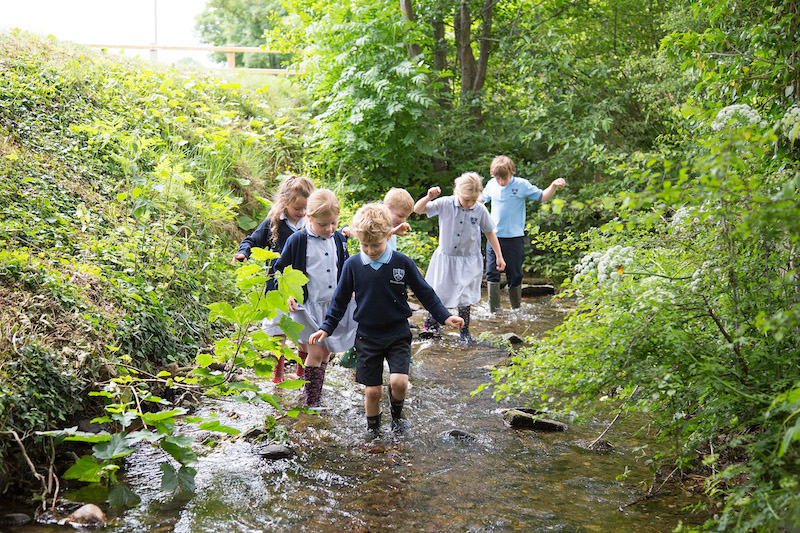The individual character of a prep school and the success of its pupils are illustrated in everything but its core lessons
Posted on 19th Apr 2017 in Prep Schools Guide, Curriculum
Children can thrive in independent schools because of the importance placed on everything that happens in addition to carefully orchestrated lessons, writes Catherine Ford, Head of Moreton First prep school in Shropshire...
“I love learning things when we don’t have lessons,” declared one young enthusiast during our Recycling Awareness Day. These are the days we remember when so much is learnt and not a book in sight!
Cast your mind back to your own days of chalk-dusted classrooms with rolling blackboards and your ink stained fingers. The lessons we remember from those times are not those that were planned to an outstanding level, complete with starter and plenary. Look beyond the lesson format and this is where we as educators can deliver the most significant lessons.
The individual character of a prep school and the success of its pupils are illustrated in everything but its core lessons. This is why at Moreton First we relish theme days such as this term’s Arctic Day and Bee Awareness Day. This is why children can thrive in independent schools because of the importance placed on everything that happens in addition to carefully orchestrated lessons.
At Moreton First, we seek out and celebrate the hidden curriculum. Without the constraints of government-designed targets we can take time to stretch and enlighten children in ways that will nurture them as global citizens. Some lessons are so fundamental to the development of empathy in our pupils that one day cannot encompass the magnitude of this ‘core’ lesson.
Whilst brainstorming for ideas, I discovered a website suggesting Cultural Awareness Day. Perhaps the solution to our end of year ‘off piste’ learning?
The suggestions were interesting, if not already familiar: invite parent speakers, celebrate the heritage of your pupils, discuss traditions of other cultures and countries, encourage discussions about other faiths, look at art from other cultures. Assigning one day or week to this theme was contrary to what we value at Moreton First. Cultural Awareness is already, quite rightly, an integral part of life here.
For two terms we have explored the whole school topic of Heritage, which was reflected in our recent Art Exhibition, and have welcomed stories and visitors who highlighted for us the wealth of understanding different cultures as celebrated in the homes and families of our own pupils.
We choose class reading books to represent a cross section of cultures and countries. This term Year Five read ‘The Breadwinner’ set against the backdrop of troubled times in Afghanistan and Year 4 studied ‘Journey to Jo’burg’, following the story of children living in a segregated country during the time of Apartheid.
How could one Awareness Day encompass everything the children have learned through our topics in Geography, which take the children on adventures to distant lands where childhood is vastly different from what they know? Or by the RS syllabus which celebrates all world religions? This month having learned about Sikhism our older pupils visited a Gurdwara in Birmingham and Year 4 went to a Mosque in Liverpool.
Perhaps the most exciting way that we promote Cultural Awareness must be the ease with which the children welcome pupils from other nations. Each visiting child contributes so much to us all by bringing their own culture into our school.
On my recent visit to schools in China, I received the warmest of welcomes and a deluge of questions about the opportunities offered by the British educational system. I was curious to understand the style of teaching large groups and how success was achieved. The answer would appear to lie in the Chinese culture, which venerates pride and respect. During my brief visit I was asked about the broad curriculum that is offered in schools such as Moreton First. This vast and ancient nation still considers Britain the trailblazer in educational practices.
To ensure all our children grow up to be global citizens holding a place in a multi-cultural society, interacting empathetically with others we must model respect and understanding of other cultures every day, not just during a theme week. In the playground I see evidence of the ‘Cultural Awareness’ as five-year-old Alina from Austria plays alongside visiting children from the Ukraine. Juan from Tenerife enjoys a game of football with his English and Welsh classmates while Reine from Paris is teaching her friends skipping rhymes from France.
I have to agree; we do learn really important things at school, especially when we are not in lessons.
Moreton First is a coeducational prep school in Shropshire, with pupils from six months to 11 years.